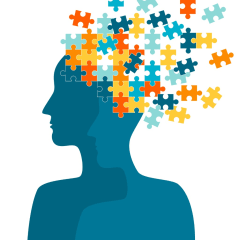The Function of Psych Therapy in Managing Stress And Anxiety and Depression
Psychiatric therapy has emerged as a foundation in the management of anxiousness and anxiety, supplying tailored treatments that vary from Cognitive-Behavioral Therapy (CBT) to mindfulness-based approaches. These techniques not just help people in identifying and reorganizing negative idea patterns yet additionally foster present-moment understanding, reducing the tendency to ponder. As we discover the different measurements of psychiatric therapy, it ends up being noticeable that these approaches do even more than merely minimize signs; they substantially improve emotional regulation and social abilities - Best Psychologist in Delhi. What stays to be taken a look at is how these restorative methods can be efficiently tailored to satisfy specific demands, thus enhancing their influence.
Understanding Stress And Anxiety and Depression
Recognizing anxiousness and depression needs an extensive take a look at these widespread psychological health conditions, which typically coexist and substantially effect a person's day-to-day live. Anxiety is characterized by relentless, excessive concern and fear about day-to-day circumstances. Signs and symptoms include restlessness, fast heart rate, and trouble focusing. Conversely, depression shows up as a prevalent feeling of sadness, vacuum, or pessimism, typically accompanied by a loss of rate of interest in formerly appreciated tasks, changes in appetite, and sleep disruptions.
The coexistence of stress and anxiety and anxiety can exacerbate signs and make complex medical diagnosis and therapy. Individuals suffering from both conditions may experience a lot more severe signs, higher disability in work and social functioning, and a much longer duration of disease. This comorbidity requires a nuanced understanding and approach to therapy.
Neurobiological factors such as natural chemical imbalances, hereditary predispositions, and ecological stress factors add to the development and upkeep of these conditions. Moreover, cognitive patterns like negative reasoning and maladaptive behaviors can perpetuate these conditions. Recognizing the complex interplay of these variables is essential for reliable intervention. Comprehensive evaluation by psychological health and wellness specialists is important to discern the visibility and extent of these problems, leading the way for tailored therapeutic techniques.
Kinds of Psychotherapy
Psychotherapy, also known as talk treatment, includes a range of treatment modalities designed to relieve signs of anxiety and anxiety by resolving the underlying psychological and emotional issues. Various types of psychiatric therapy are customized to satisfy the special needs of individuals, giving a variety of techniques to mental healthcare.
One extensively utilized kind is psychodynamic treatment, which concentrates on understanding and settling unconscious disputes coming from very early life experiences. By exploring these deep-seated problems, clients acquire understanding right into their present habits and emotional state.
Interpersonal Treatment (IPT) is an additional effective method that focuses on enhancing social connections and function to reduce depressive signs. It normally resolves issues such as despair, duty changes, and interpersonal disagreements.
Humanistic therapies, such as Client-Centered Therapy, emphasize personal development and self-actualization. Best Psychologist in Delhi. These strategies produce a supportive environment where people can discover their feelings and establish a more powerful sense of self
Last But Not Least, Dialectical Actions Therapy (DBT) incorporates cognitive-behavioral techniques with mindfulness practices. Originally created for borderline individuality disorder, DBT has been adapted to treat stress and anxiety and clinical depression by teaching abilities in distress resistance, emotional policy, and social effectiveness.
These varied psychotherapeutic methods offer multiple pathways to mental health and wellness and well-being, satisfying restorative needs and specific preferences.
Cognitive-Behavioral Therapy (CBT)
Amongst the numerous psychotherapeutic methods, Cognitive-Behavioral Treatment (CBT) stands out for its structured, goal-oriented technique in treating anxiousness and clinical depression. Developed by Aaron T. Beck in the 1960s, CBT is asserted on the idea that maladaptive reasoning patterns add considerably to emotional distress and behavior issues. By recognizing and reorganizing these adverse thought patterns, CBT aims to reduce signs and foster much healthier cognitive procedures.
The therapy includes a variety of strategies, consisting of cognitive restructuring, exposure therapy, and behavioral activation. Cognitive restructuring focuses on testing and changing altered cognitions, while exposure treatment slowly accustoms patients to anxiety-provoking stimulations, decreasing avoidance actions.
Empirical proof underscores the efficacy of CBT, with numerous research studies demonstrating its efficiency in minimizing symptoms of anxiousness and depression. This healing method has actually been adapted for various populations and setups, confirming adaptable and versatile. Its organized nature, empirical support, and concentrate on skill acquisition make CBT a keystone in the psychotherapeutic treatment of anxiousness and clinical depression.
Mindfulness-Based Methods
Mindfulness-Based Strategies have amassed considerable attention in recent times as reliable treatments for anxiety and clinical depression. Rooted in old meditation practices, these techniques aim to grow a heightened awareness of today minute, which can help individuals disengage from the ruminative thought patterns frequently connected with stress and anxiety and depressive problems.

Likewise, Mindfulness-Based Cognitive Therapy (MBCT) incorporates concepts from Cognitive-Behavioral Treatment (CBT) with mindfulness strategies. MBCT is particularly efficient Discover More Here in stopping regression in people with reoccurring anxiety. By acknowledging very early warning indicators of depressive episodes, people learnt MBCT can use mindfulness practices to minimize useful site the beginning of full-blown episodes.
Advantages of Psychiatric Therapy
Countless researches have demonstrated the extensive benefits of psychotherapy for people coming to grips with stress and anxiety and depression. One of the crucial benefits is the renovation of psychological policy. Psychotherapy outfits individuals with dealing methods to handle stressful feelings, thus decreasing symptoms of anxiety and anxiety. Cognitive-behavioral therapy (CBT), for example, aids individuals identify and challenge unfavorable idea patterns, fostering a much more favorable and balanced expectation.
Moreover, psychotherapy supplies an organized environment for self-exploration and insight. By reviewing their experiences and sensations with a skilled specialist, individuals can uncover underlying concerns adding to their mental health struggles. This self-awareness is a critical action toward long-lasting recuperation and durability.
Another significant advantage is the improvement of interpersonal skills. Stress and anxiety and clinical depression commonly stress connections, leading to isolation. Via therapeutic treatments, people discover reliable communication and conflict-resolution abilities, which can enhance their interactions and foster helpful connections.
In addition, psychotherapy provides a customized strategy to therapy. Inevitably, the advantages of psychiatric therapy extend beyond sign relief, contributing to total wellness and quality of life.

Final Thought
Psychotherapy significantly contributes to the management of anxiousness and anxiety by using reliable coping strategies and a safe environment for self-exploration. Techniques such as Cognitive-Behavioral Treatment (CBT) and mindfulness-based approaches are critical in determining and restructuring negative idea patterns, while advertising present-moment recognition. These customized treatments not just ease signs however additionally improve psychological guideline and social abilities, thus improving overall wellness and lifestyle for individuals facing these mental health challenges.
Psychiatric therapy has actually emerged as a keystone in the monitoring of anxiety and depression, offering tailored treatments that range from Cognitive-Behavioral Therapy (CBT) to mindfulness-based strategies.Comprehending stress and anxiety and clinical depression needs a comprehensive look at these prevalent psychological health conditions, which typically coexist and click here for more info substantially effect an individual's daily life.Amongst the different psychotherapeutic modalities, Cognitive-Behavioral Therapy (CBT) stands out for its structured, goal-oriented technique in treating stress and anxiety and clinical depression.Numerous research studies have shown the extensive advantages of psychiatric therapy for people grappling with anxiety and clinical depression. Psychiatric therapy equips individuals with coping methods to manage traumatic emotions, thereby minimizing symptoms of anxiousness and clinical depression.
Comments on “Locating the Best Psychologist in Delhi: A Guide to Your Mental Wellness Trip”